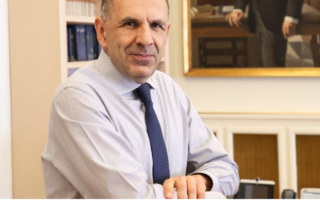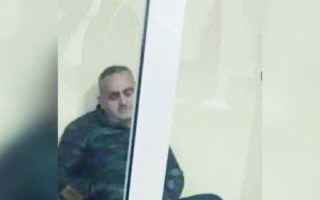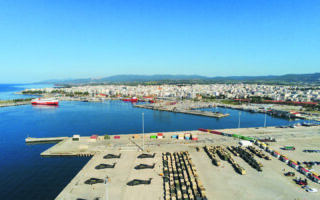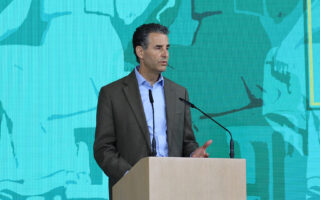A vision for the American College of Greece
Deree is offering high-caliber degrees, Pierce is expanding and institution’s reputation is growing, says new board chairman
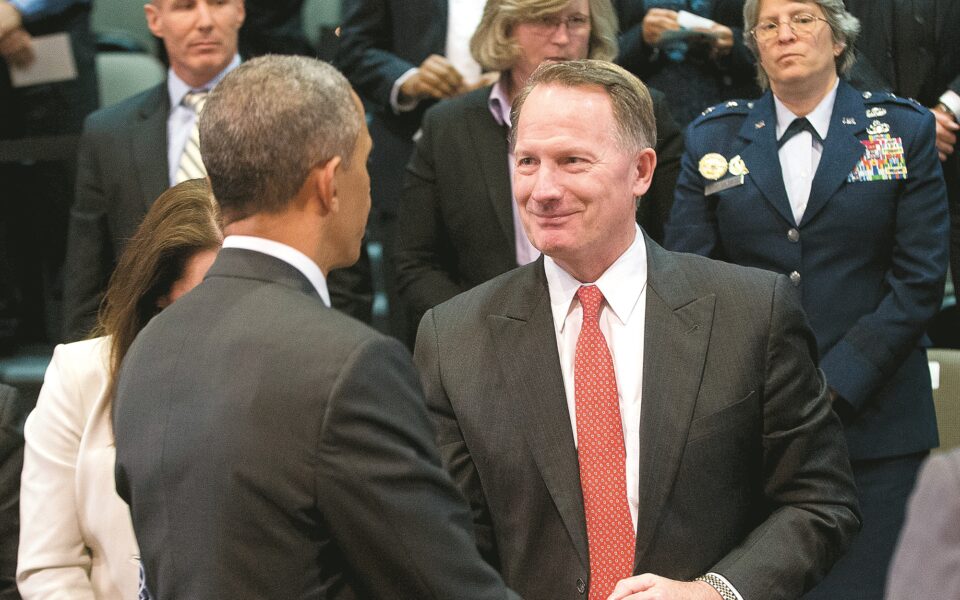
The many advantages offered by and the many future plans for the American College of Greece (ACG) – which comprises Pierce College, for primary and secondary education, Deree College, for undergraduates and postgraduates, and Alba Graduate Business School – are underscored by the new chairman of the board, Dan Smith, speaking to Kathimerini.
He says that the oldest American college in Europe offers students everything they would have at a university in the United States, while noting that investments are being made to grow and improve ACG, with more research, publications and educational exchanges that will enhance its reputation. A dorm is also being added to host American and other international students.
Smith, who served as US ambassador to Greece in a tough period between 2010 and 2013 – and who also served as secretary of state in January 21 as a result of his position in the State Department’s hierarchy until Antony Blinken was sworn in – goes on to talk about how much Washington appreciates Greece’s role in the East Mediterranean and express his belief that when it comes to Greek-Turkish relations, a lot will depend on whether President Recep Tayyip Erdogan decides to make the necessary compromises.
The American College of Greece was founded in Smyrna in 1875 and was headquartered there until the Asia Minor Disaster in 1922, after which it moved to Greece on the invitation of Prime Minister Eleftherios Venizelos, and opened in Athens in 1923 – making 2023 a centennial year for ACG.
Let’s start with how your involvement came about.
Well, I retired from the State Department, from the Foreign Service, about a year and a half ago and reached out to President [David] Horner and told him I’d love to be connected with Greece in any way, especially with Greek-American relations when it comes to education. I asked him if there was a way I could be of help, and he brought me on to the board of trustees of ACG. And over the course of a couple of meetings, I suddenly found myself as the chair of the board of ACG, which I’m delighted to do. It’s a wonderful institution. I think it has a very promising future in front of it. It recently added an elementary school, and there are plans to expand even more the footprint in Greece. We are attracting a lot more American and other international students.
That was one of my questions. I assume you do attract Greeks who finished Greek school, but what about other students from abroad?
It’s primarily Greeks, but we’re attracting more international students. Already 17% of our student body is international, the largest percentage of which is Americans. The second largest group is Egyptian. We have students from the Middle East and from all over the world – 70 countries in all. We’ve also provided opportunities to a number of refugees, especially Ukrainian students who have fled the war and come here to study. But increasingly there’s growing interest on the part of American students too, who want to spend a year abroad or want to finish their degree here. And for them, it’s a wonderful opportunity to get to know Greece, to get to know Europe, but it is also a reasonable financial proposition by American standards, so it makes it very attractive. Just last week, I met American students who intend to pursue their undergraduate degree at ACG. So, the reputation of ACG is spreading.
Are we talking about a full four-year period, or just transfers from a US college, or a year abroad, or all of the above?
All of the above. Some are coming for a year or a semester. Some are coming directly from a US high school and others are transferring from a US college or university and are going to get their degree from ACG. And so it’s a very dynamic time for the institution.
Any plans, academically speaking, to make it even more attractive to the American student?
Well, it already is attractive to a large degree. The campus is beautiful. And we are building a new residence hall – our fifth – that can house American and other international students within walking distance of the campus. That will be very attractive to American students. But I think the investments the school is making in terms of quality and development of the faculty, allowing for more research and publications, will also enhance the attractiveness of the school. We can also host educational exchanges, bring professors over, and send academics and students to the United States. I think that can enhance the reputation of ACG.
Do you also have plans to promote the school in the US? There was recently a conference that took place in March, in Washington, DC. Is that part of the whole approach?
Absolutely, for a couple of reasons. One goal was to enhance the brand so that we attract more students to come study in Greece. But I think it’s also important to attract support not only from the Greek-American diaspora, but from Americans in general who believe in the importance of education and the role it plays in enhancing international understanding and strengthening bilateral relations, especially between the United States and Greece. And so the purpose was really to market ourselves to a community that may not be that aware of ACG. We had some alumni at the event and people who know ACG, but we want to reach a broader audience with events like the one in Washington. When we’re in Washington, we can also spend time with Congress and with administration officials. So it’s a great opportunity for us.
How could Congress or the administration – any administration – help?
It’s the oldest American college outside the US in Europe. I assume that’s already an angle, but I guess you need some points to make, in order for an American to come and study or an American politician to pay attention, to think of funding. There already has been funding from USAID, which has provided financial support to ACG over the years. But, you know, given the budget climate in Washington, you never know what might happen. That said, we think the more Americans, whether in politics, business or academics, understand the importance of ACG and the contribution it makes to Greece and Greek-American relations, the better. We would like them to see ACG as a venue to engage with Greek audiences and contribute to the bilateral relationship.
‘Seventeen percent of our student body is international, the largest percentage of which is Americans. The second largest group is Egyptian. We have students from 70 countries in all’
Could it become more of a regional college and not confined to Greece?
Absolutely. Part of the vision is to make it a regional hub for not just Greek students, but also students from throughout the broader region. I met the other day a Syrian student who was here studying at Deree/ACG. And I think it can be very attractive for students not only from Balkan countries but also the Middle East. These students come to study at ACG and get an excellent education, but also learn about Greece and benefit from English instruction in an American educational environment. It offers the best of both Greece and the US, and it’s more affordable than studying in the United States.
Is financial assistance for Americans available if they go to a school like Deree?
I believe ACG is the only US college in Greece at the moment where American students are eligible for US government-subsidized loans. That fact, and the relatively low tuition of ACG as compared to US institutions, really makes ACG of tremendous value for American students.
What would you say is its main competition?
When choosing to go study in other European countries, Americans focused until recently on Britain, Germany, France, Spain and Italy. We are determined to make Greece a stronger competitor. Also, we offer to foreign students beautiful residences and top-notch facilities unique to Greece, but we also offer other services, like all the support mechanisms from the Office of Student Affairs – we assist them in their daily needs (shopping, doctors, paperwork, bureaucracy). But we also offer plenty of extracurricular activities – they get the full US student experience, including participation in outside events, volunteer activities, clubs and societies. All the amenities that they would get if they were studying at a US university.
Somebody interested in history or archaeology may choose Greece or Italy for their studies, but what about somebody who is into math or sciences?
We’re building a number of centers of excellence to attract students beyond those interested in classical studies. Greece sells itself if you are a student of classical studies, but I think we can be competitive in other areas as well. We’re not going to compete in engineering or the sciences with MIT, but we can offer a very cost-effective and well-rounded education that is attractive to people. And we have plans for the future. I don’t want to go into details yet because we haven’t announced them, but we have plans for building on our success and reputation for excellence.
Finally, I would note that ACG is celebrating a hundred years of operation in Greece this year, and in 2025 will celebrate 150 years since our founding in Smyrna. Indeed, the history of ACG parallels in many ways the history of Greece over this period – we have survived the same challenges and emerged stronger, just as Greece has. It is a remarkable history of resilience and determination, and provides a legacy of which we are all proud.
You’ve been here as an ambassador from 2010 to 2013. During difficult, interesting years. What’s your view of this decade? On the country first, and, secondly, on US Greek relations under different US administrations and different Greek governments.
There’s been a great transformation. This has always been an important bilateral relationship, but it has been troubled at times in the past. But I think we witnessed a turning point over the course of the past decade, and it’s come to a point now where the relationship has probably never been stronger. Greece has grown as an attractive place not just for tourism, but for foreign investment in general. Greece has come through a very difficult period, but is emerging even stronger and, hopefully, more prosperous. There are still challenges, but I think the foundation is strong and hope that prosperity will continue. Obviously, there’s a political dynamic to that relationship, but I think that should transcend parties or individual governments.
How different can you get from George Papandreou to Antonis Samaras, to Alexis Tsipras to Kyriakos Mitsotakis, and from Barack Obama to Donald Trump to Joe Biden? And, correct me if I’m wrong, but during this whole period, things continued to evolve in a positive direction.
That’s my perspective, too. I mean, there was a lot of anxiety about how it would survive in politically interesting times. But I think it has been on a good trajectory. I do believe that the future is promising in this regard. Certainly, from an American perspective, the value of Greece has never been more apparent – strategically, in terms of the role that Greece has played in the Ukraine war as well as its role as a beacon of stability in the Eastern Mediterranean. I think this is fully appreciated in Washington, and that will help as we go forward.
What was the turning point? Was it the economic crisis?
I think it was a combination of things. It was in part Greece’s successful handling of the economic crisis, which was not apparent to everyone at the time. The fact that Greece was able to do what it did in making some very difficult decisions and the sacrifices that the Greek people endured was incredible. Americans were impressed with the resilience and determination of the Greek people, even as many so-called experts were ready to count Greece out and predicted that the country would be forced out of the eurozone. They were proven wrong. The credit belongs to the Greek people. But there are other elements as well, especially the role that Greece has played as a bulwark of peace and stability in the region.
Finally, we had an election here and an election in Turkey. How do you see this relationship?
From Washington’s perspective, we would love to see a rapprochement between Greece and Turkey. There are some difficult issues that are going to have to be addressed – Cyprus not being the least of those. But the hope is that given the success of this government in Greece and with the re-election of Erdogan, there may be an opportunity to make progress. Much will depend on what happens in Turkey, of course, and whether Erdogan is willing to address difficult issues and make the compromises that will be needed.
